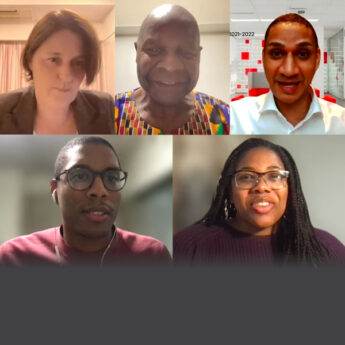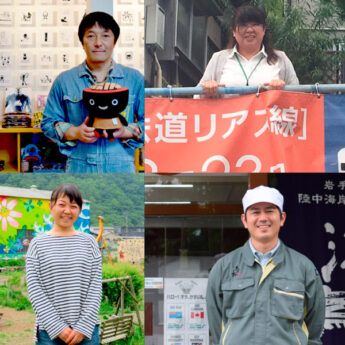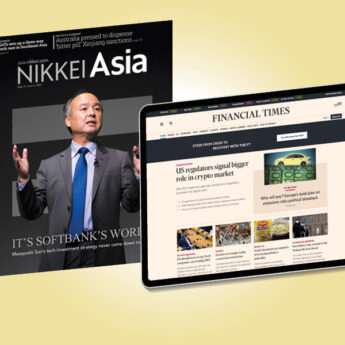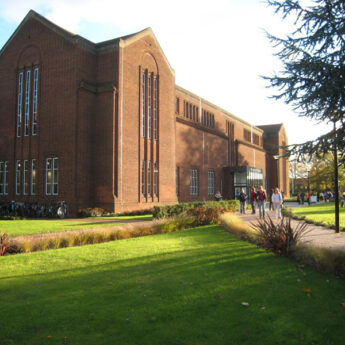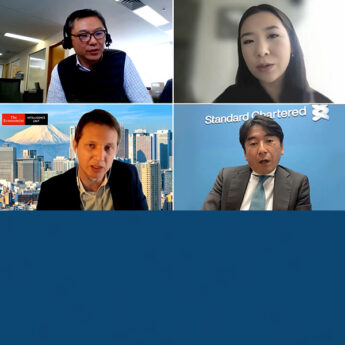On 22 August, a meeting was held at the British Chamber of Commerce in Japan (BCCJ) with members of the UK Department for International Trade’s World Events team, who were visiting Japan.
Members of the BCCJ were given an update on the UK government’s plans for the Rugby World Cup 2019 in Japan and the Tokyo 2020 Olympic and Paralympic Games, looking at business in relation to the two major sporting events.
Following the event, BCCJ ACUMEN put some questions to David Mulholland, head of events, Olympics, Paralympics, Rugby World Cup at the British Embassy Tokyo.
While Mulholland stressed that there is still a good deal of planning to be done and processes to be worked through, the team is ambitious, and wants to keep BCCJ ACUMEN readers informed.

Participants at the event heard about the government’s plans from David Mulholland (second from right).
Please update us on the UK Government’s plan for activation at the 2019 Rugby World Cup and 2020 Tokyo Olympics and Paralympics.
During the week of 20–24 August, the Department for International Trade’s (DIT) World Events team visited Tokyo on a scoping mission to formulate Her Majesty’s Government’s plans to activate during the Rugby World Cup 2019 (RWC) and Tokyo 2020 Olympic and Paralympic Games.
Its members visited the BCCJ on 22 August to participate in an interactive session with members of the British business community with the aim of giving a high-level overview of what could be possible around these big sporting moments, but more fundamentally at this stage to listen to and engage with participants on their views, opinions and ideas.
It is clear that the RWC and Tokyo 2020 offer great opportunities to capture the attention of the world as all eyes descend upon Japan during this time. The UK government aims to maximise this opportunity to keep the UK in the spotlight in a number of important areas, such as: business and government level engagement; the arts, creativity and culture; the power of sport in diplomacy; diversity and inclusion; and the UK’s role in innovating for a shared future, to name a few.
Working alongside the British Council as it launches its Season of Culture in 2019–2020 is an important part of these plans, and will enable the UK government to reach new audiences to deliver important messages within these focus areas.
The team is now in an important planning phase to realise what this activation may look like and importantly define the core objectives and deliverables. The chance to hear directly from businesses on the ground in Japan was highly appreciated and gave the team some good inspiration to plan effectively for these important events.
Are there any commercial opportunities for SMEs or others related to the two events?
The British Embassy Tokyo’s DIT Sports Economy sector team, which has carefully monitored and shared tender information, has been working closely with many UK companies to support potential commercial gains from the two events.
Both respective organising committees for the RWC and Tokyo 2020 recognise the strengths, capabilities and expertise the UK can offer in terms of hosting global sports events, being previous hosts of the Rugby World Cup 2015 and the London 2012 Olympic and Paralympic Games.
At government level, two formal agreements were signed, a Sports Host 2 Host agreement—to share knowledge and business opportunities— and an Olympic Security Statement of Intent, confirming the close dialogue and collaboration
at play.
The team has identified key areas of opportunity to win contracts in security, overlay, hospitality, crowd control, creative industries and ICT.
In order to support businesses to achieve these ambitions, DIT has been working to directly influence the Japanese government, the event organising committees, prime Japanese contractors who have already won business, and the extensive network of national and international companies needing to activate their event sponsorship.
There are, of course, challenges within this domestically influenced procurement environment, and as such a key tactic is to identify local business partners and win business in a collaborative approach.
The UK is well positioned to offer the highest levels of expertise in many facets of event delivery and the DIT team is on hand to support this work.
What tips can you offer firms in Japan or the UK hoping to partner with sponsors, or already selected to do work for the events?
Building local partner relationships is one of the most important elements to success in the area of influencing sponsors and companies. The sponsorship domain is certainly the most challenging due to strict policy from the sporting bodies, with the opportunities limited to already recognised official partners and sponsors.
Understanding what their needs are is key, and how UK firms could provide services to support them is where gains could be made.
Again, the DIT team can offer advice and support in this area for interested UK companies.

